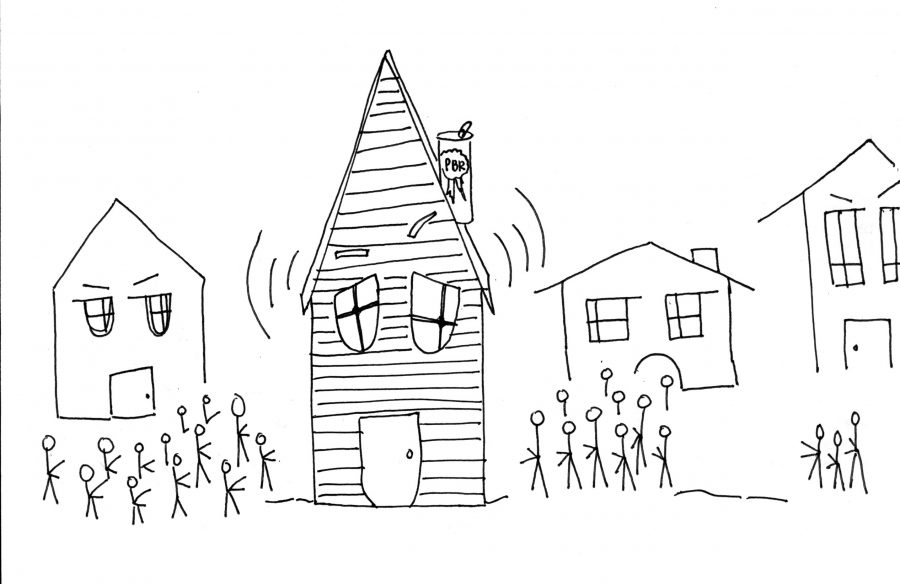There are no parties here!” my neighbor yelled at my friend on the first day of school last year, assuming she was a first-year walking around to find parties. “I’m just looking for my friend!” she yelled back at him and scurried up the apartment stairs.
This was the closest thing to “get off my lawn” I’d ever heard in real life, especially considering the same neighbors frequently discuss new ways of preventing kids from trampling their manicured sidewalk-gardens.
Similarly, a retired friend of mine who lives downtown tells me he frequently reports noise violations just so the police have statistics on neighborhood disturbances. No matter what they do, the problem doesn’t go away; “It’s the moving groups of people that are the worst,” he said.
Yet another adult friend wishes students would move out of town so he could afford to move into a place downtown closer to his workplace.
Although I enjoy the accommodations of downtown living, I frequently find myself agreeing with these neighbors and friends. Maybe UVM students should not be allowed to live downtown at all.
There is no doubt that incredible obstacles stand in the way of moving off-campus students out of the city and onto campus, but nevertheless, please dilly-dally with me through a stream of could-be machinations.
Let’s first visit the moves that other universities have taken to relieve their neighboring cities of the student burden, and the benefits that have resulted from these changes.
Take, for example, the University of Washington, which occupies a huge campus north of Seattle, famous for its spring cherry blossoms, not to mention quality of education. Their campus didn’t always looks the way it does now.
In 1895, UW was moved to its current campus outside of the city to get away from the “evils of city life,” according to UW’s campus web timeline.
Prior to the switch, the university occupied 10 acres inside what is now an over 650,000 person city. UW still owns that city land, which is now some of the most valuable property in the city, all because the darn kids didn’t spoil it.
If UW stayed put, it may have been more like Boston University, to use a familiar example. Boston is approximately the same size as Seattle, and the BU and UW campuses were around the same size when established, according to BU’s campus history on their website.
Another, perhaps more familiar example to East-coast types, is Columbia University, which moved a total of three times. Columbia’s last move was from 49th Street in the center of Manhattan to a beautiful cam- pus uptown, according to Columbia’s webpage.
It’s hard to say what would have happened if Columbia hadn’t moved, but it’s safe to say their previous location wouldn’t have become the same shopping and theatre metropolis we are all familiar with.
Excuse me if these cities seem far-off considering they are far larger the Burlington, but recall that when UW decided to ditch the evils of city life, the population of Seattle was the same as Burlington is today, according to the U.S. Census Bureau.
According to U.S. News rankings, only half of UVM student currently live in on-campus organized housing. Thus, the University could not accommodate them all if they were forced to live on-campus.
What I want to know is, what might happen should the University suddenly have the option of making the radical changes these other colleges made, and decided to force all students out of Burlington entirely?
The most tangible result is that rent would decrease significantly, especially as short-term demand for housing decreases when students suddenly move out of town and property owners need to fill apartments.
Fewer students off-campus allow for more working professionals in town, who in turn would both take better care of their apartments and demand more from their property owners.
If all this happened, it could lead to a better downtown district that is better kept and more desirable for working adults.
On the student side of things, forcing all students to live on-campus would reposition the center of student life at UVM, rather than having a fissure between lower-class students on-campus and upper-class students, many of whom live off-campus.
These fantasies bring a whole new meaning to the words “get off my lawn” and are unlikely to be realized in our days here.
But in the meantime, when you’re partying downtown, skateboarding late into the night or disturbing your neighbors, please lend a little more credence to what they need out of our city in light of the radical changes other universities have made.








